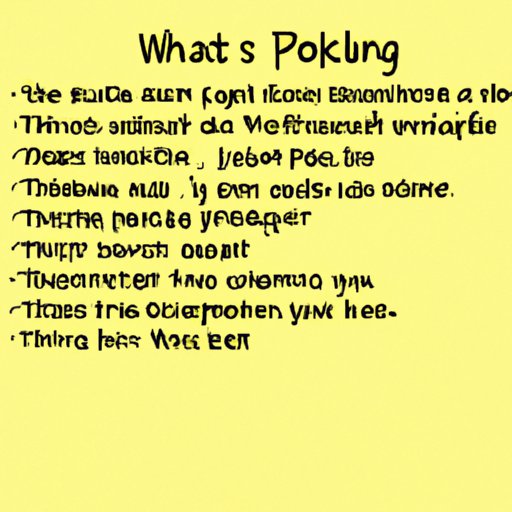Introduction
Writing prompts are short statements or questions that help students think about a particular topic or idea. They can be used as a starting point for writing, allowing writers to explore an idea or come up with new ideas. Writing prompts can be used in any type of writing, from fiction to non-fiction, and can be beneficial for both beginning and experienced writers.

Exploring the Benefits of Using Writing Prompts
Using writing prompts can have many benefits for writers of all ages. Here are just a few of the advantages of using writing prompts:
Improved Thinking Skills
Writing prompts can help improve thinking skills by encouraging students to look at a topic from different angles. This can help them develop their critical thinking and problem solving skills, which can be beneficial in other areas of their life.
Enhances Creativity
Writing prompts can also help enhance creativity by giving students the opportunity to explore ideas they may not have thought of before. By forcing them to think outside the box, they can come up with new and interesting ideas that can be used in their writing.
Increased Motivation and Engagement
Writing prompts can also help increase motivation and engagement. By providing students with interesting topics to write about, they can become more interested in the writing process and feel more motivated to complete their work.
Tips for Creating Effective Writing Prompts
Creating effective writing prompts can be a challenge, but there are some tips that can help make it easier. Here are a few tips for creating effective writing prompts:
Keep it Simple
When creating writing prompts, it is important to keep them simple. Complicated topics or questions can be difficult for students to understand or answer, so try to keep the prompts as straightforward as possible.
Focus on Specific Topics
It’s also important to focus on specific topics when creating writing prompts. Broad topics can be overwhelming and may lead to vague answers, so try to stick to topics that are easy to understand and relate to.
Use Varied Types of Prompts
When creating writing prompts, it’s also important to use varied types of prompts. For example, prompts can be open-ended questions, statements, scenarios, or images. Using different types of prompts can help keep students engaged and can help them explore different perspectives on a topic.

Creative Writing Prompts to Inspire Writing
If you’re looking for some creative writing prompt examples to get you started, here are a few ideas:
Imagination-Based Prompts
Imagination-based prompts are great for inspiring creative writing. These prompts can be anything from “imagine you are a bird flying through the sky” to “imagine you are an explorer discovering a new land.”
Emotion-Based Prompts
Emotion-based prompts can help students explore their feelings and emotions. These prompts can range from “how do you feel when you’re alone?” to “how do you react when someone hurts your feelings?”
Character-Based Prompts
Character-based prompts can help students create characters or explore relationships between characters. These prompts can be anything from “describe a character who is brave” to “write a story about two friends who have a disagreement.”

Analyzing Popular Writing Prompt Examples
In addition to creating your own writing prompts, it can be helpful to analyze popular writing prompt examples to get an idea of what makes a successful prompt. Here are a few things to consider when analyzing writing prompt examples:
Examining Prompt Structure
When analyzing writing prompt examples, it is important to examine the structure of the prompt. Look at how the prompt is phrased, how long it is, and what type of prompt it is. This can help you determine if the prompt is clear and concise, and if it is likely to be effective for the audience you are targeting.
Investigating Different Types of Prompts
It can also be helpful to investigate different types of prompts. For example, look at open-ended questions, statements, scenarios, and images. This can give you an idea of how each type of prompt can be used and what kind of responses they may elicit.
Understanding the Benefits of Each Example
Finally, it is important to understand the benefits of each example. Consider why the prompt may be effective and how it could be used to engage readers. This can help you create prompts that are more likely to be successful.
Conclusion
Writing prompts can be a great way to motivate and inspire writers. They can help improve thinking skills, enhance creativity, and increase motivation and engagement. When creating writing prompts, it is important to keep them simple, focus on specific topics, and use varied types of prompts. Analyzing popular writing prompt examples can also be helpful in understanding what makes a successful prompt.
Overall, writing prompts can be a great tool for writers of all levels. They can help writers explore ideas and come up with new and creative solutions. By understanding the benefits of writing prompts and examining popular writing prompt examples, you can create effective prompts that will engage and inspire your audience.
(Note: Is this article not meeting your expectations? Do you have knowledge or insights to share? Unlock new opportunities and expand your reach by joining our authors team. Click Registration to join us and share your expertise with our readers.)
